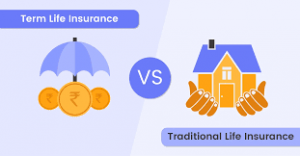Life insurance is a crucial part of financial planning — especially if you have dependents or debts. But when it comes to choosing the right kind of policy, many Americans get confused between life insurance and term insurance.

While they sound similar, they’re very different in purpose, cost, and benefits. This guide breaks it down simply to help you decide what’s best for your needs.
What Is Life Insurance?
“Life insurance” is a broad term, but when people refer to it generally in the US, they often mean whole life insurance — a policy that lasts your entire life and includes an investment or savings component called “cash value.”
Key Features:
-
Covers your entire life (as long as you pay premiums)
-
Cash value builds over time (like a savings account)
-
Premiums are higher but stay the same
-
You can borrow from the cash value
There are also other types of permanent life insurance:
-
Universal life insurance
-
Variable life insurance
Each has its own mix of flexibility and investment options.
What Is Term Insurance?
Term insurance is the simplest and most affordable type of life insurance. It offers coverage for a set period of time — usually 10, 20, or 30 years.
Key Features:
-
Covers only a specific time period
-
No cash value — it’s pure insurance
-
If you die during the term, your beneficiaries receive the payout
-
If you outlive the term, the policy ends with no return
Term life is ideal for people who want protection during certain life stages, like while raising kids, paying off a mortgage, or planning for college expenses.
Pros and Cons of Life (Whole) Insurance
Pros:
-
Lifetime coverage
-
Builds savings (cash value)
-
Can borrow against policy
-
Premiums never increase
Cons:
-
Much more expensive than term
-
Cash value grows slowly
-
Hard to cancel without penalties
-
Complex to understand for beginners
Pros and Cons of Term Insurance
Pros:
-
Very affordable
-
Easy to understand
-
Covers key life stages (like parenting or home loans)
-
Good for temporary financial responsibilities
Cons:
-
No savings or cash value
-
Coverage ends after term
-
Premiums increase if renewed later
-
No return if the policy expires and you’re still alive
Which One Is Better for You?
It depends on your needs and financial goals. Here’s how to decide:
Choose Term Insurance if:
-
You’re looking for affordable coverage
-
You have temporary financial responsibilities (like raising kids, repaying loans)
-
You want to maximize coverage for a low cost
-
You’re younger and want protection during working years
Choose Whole Life Insurance if:
-
You want lifetime coverage
-
You’re looking for a forced savings tool
-
You want to leave wealth to heirs
-
You have complex estate planning needs
Real-Life Examples
Example 1: Sarah, 32
She just had a baby and took a mortgage. She chooses a 20-year term policy so her family is protected while her child grows and the loan is repaid.
Example 2: Robert, 50
He’s financially stable, wants lifetime coverage, and prefers a policy that builds value. He chooses whole life insurance for peace of mind and long-term estate planning.
